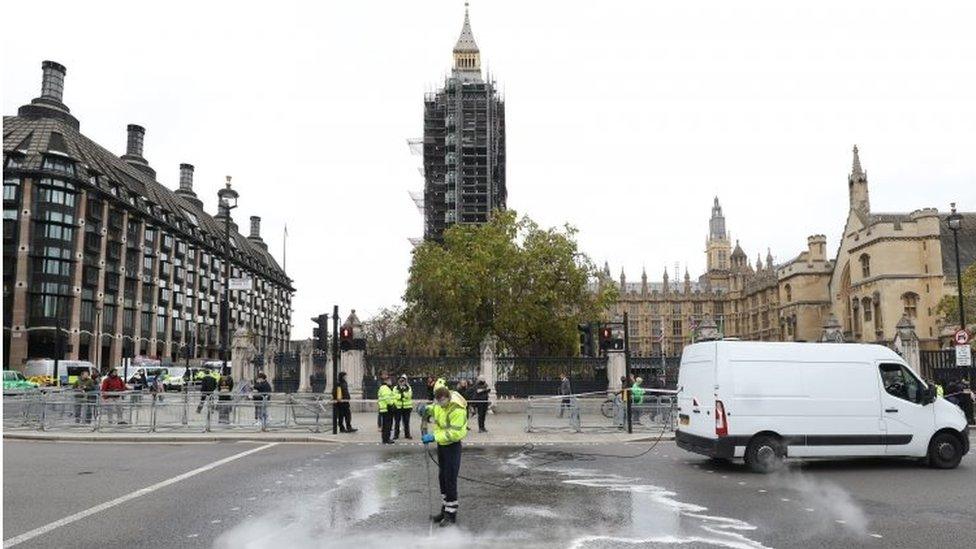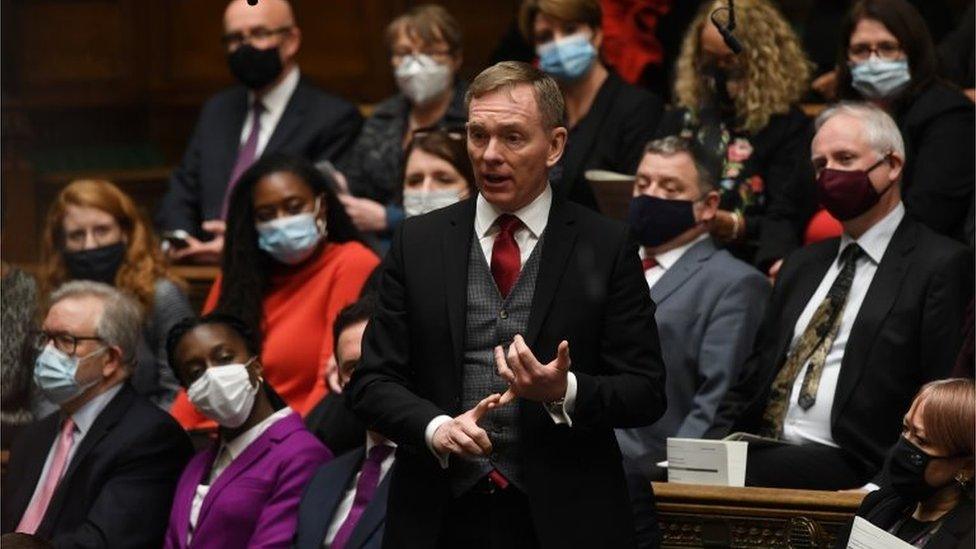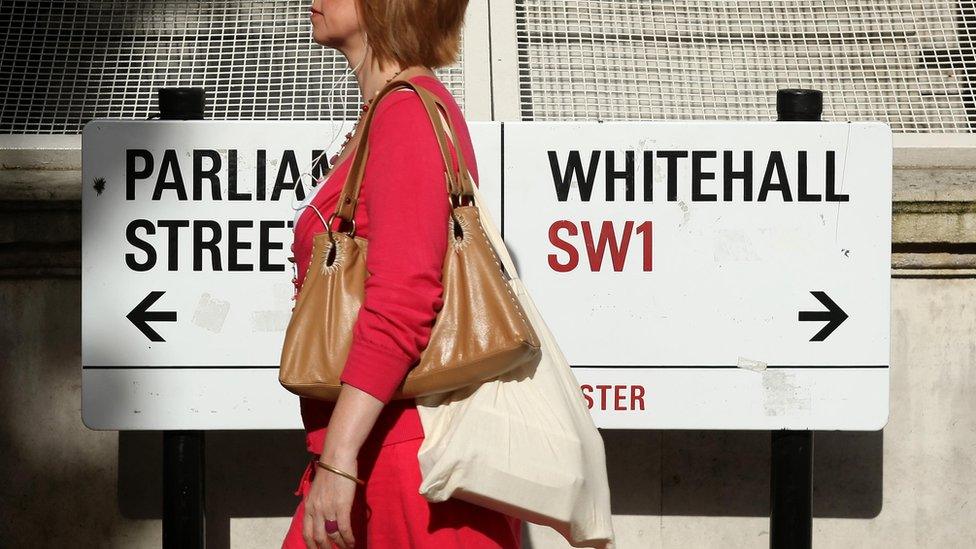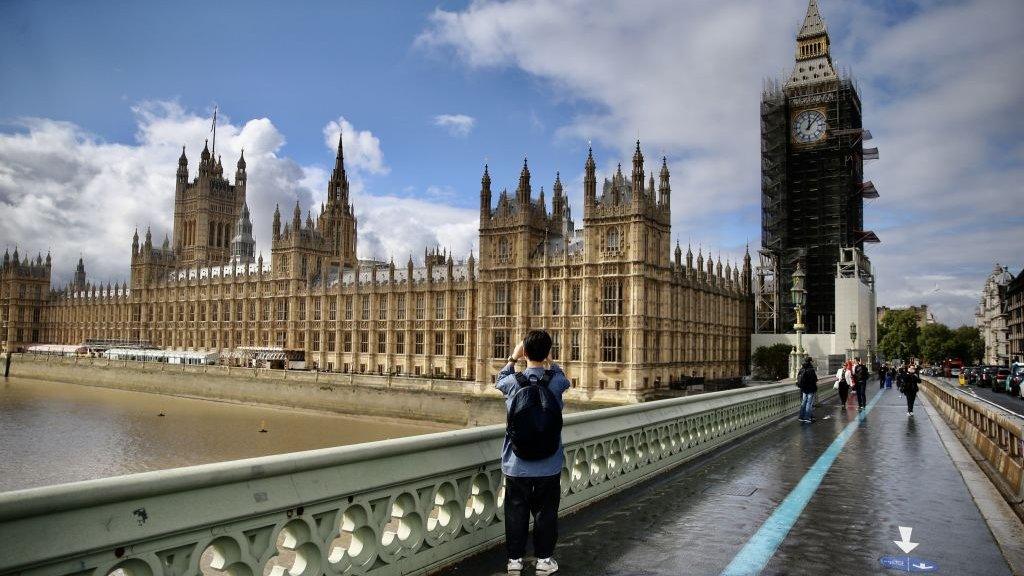Ban MPs from paid consultancy roles, suggests standards committee
- Published

MPs should be banned from providing paid parliamentary advice or consultancy services, a report from the MPs' standards committee has proposed.
It comes after the case of former MP Owen Paterson triggered concern about MPs lobbying or holding second jobs.
The committee also suggested MPs should be investigated for making "excessive" personal attacks online.
Earlier, Labour had called for an overhaul of the system which regulates ministers' conduct.
The government has said it is committed to "reinforcing high standards".
There has been renewed scrutiny of standards in general at Westminster recently, after the government's failed attempt to change the system, while blocking the suspension of the former Conservative MP Mr Paterson.
Liberal Democrat leader Sir Ed Davey has since been added to the list of MPs under investigation, external by Kathryn Stone, the parliamentary commissioner for standards - in his case the investigation relates to the "registration and declaration of an interest".
Earlier this month, MPs supported a government proposal asking the committee to come up with recommendations for banning MPs from taking on certain jobs - however, Labour said its own plan to curb second jobs was tougher.
On Monday, the Commons Standards Committee, chaired by Labour MP Chris Bryant, published its long-awaited review into the current code of conduct for MPs.
The report made a number of draft recommendations including introducing a ban on MPs "providing paid parliamentary advice, consultancy, or strategy services".
It said MPs taking on second jobs should first seek guidance from the standards commissioner, and where an MP does take on additional work, they should ensure their contract says that they cannot lobby ministers or public officials on behalf of their employer, the committee said.
'Respect'
The committee has also suggested that a principle of "respect" is added to the MPs' code of conduct.
This would mean an MP could be investigated for breaching the code if they subjected anyone "to unreasonable and excessive personal attack in any medium" - which includes social media.
Such a move would bring the House of Commons into line with its Welsh and Northern Ireland counterparts.
Following the committee's report into Mr Paterson, there was some criticism from Conservatives that the process was unfair, and specifically did not allow for MPs to appeal the conclusions of an investigation.
The committee has said it would ask a "senior judicial figure" to judge its processes.

Labour MP Chris Bryant chairs the Standards Committee
Under the committee's suggestions, ministers would have to declare any gifts and hospitality on the House of Commons register - in addition to the lists of ministers interests.
This would mean any breaches by ministers could be investigated by the standards commissioner. Currently the prime minister judges whether someone has broken the ministerial code.
The committee stressed that its recommendations were in draft form and that it would consult further before publishing a final set of proposals for MPs to debate and vote on - expected around Easter 2022.
Earlier, Labour called for an overhaul of the system regulating ministers' conduct, accusing Prime Minister Boris Johnson of failing to enforce current rules.
Deputy leader Angela Rayner said ministers should be banned from work relating to their past job for five years after leaving government.
Angela Rayner: People should get contracts based upon their competency to do the job
Labour argued the current rules on ministers' behaviour do not work and have failed to prevent what it describes as government corruption.
In a speech to the Institute for Government think tank, Ms Rayner said democracy could not "hinge on gentlemen's agreements" and called for a new body to replace the current post of independent adviser on ministerial interests.
Ms Rayner argued that the role was "toothless" because its holder could not investigate possible breaches of the rules by ministers unless ordered to do so by the prime minister.
Instead, Labour says it would set up an "independent integrity and ethics commission" to initiate investigations into ministers' conduct without first having to seek the approval of the prime minister.
It would have powers to punish those who break the rules.
Ms Rayner told BBC Breakfast: "We think it's really important that we clean up the [system] because only under this prime minister have we seen that the code's been so flagrantly disregarded, and we can't have this undermining of public standards.
"People have to have trust in ministers doing the job that they're there to do, and that's to protect the British electorate and protect our interests, not their own."
'Trust and confidence'
Responding to Ms Rayner's speech, Cabinet Office spokesman said: "The government has committed to continually reinforcing high standards of conduct in public life so the public can have trust and confidence in the operation of government at all levels.
"It's absolutely right that we fully take account of all of the evidence and work up the best solutions before responding."
The spokesman said the government would consider past reports - including one by the Committee on Standards - and would give an update to Parliament "in due course".
Related topics
- Published18 November 2021

- Published1 November 2021

- Published16 November 2021
